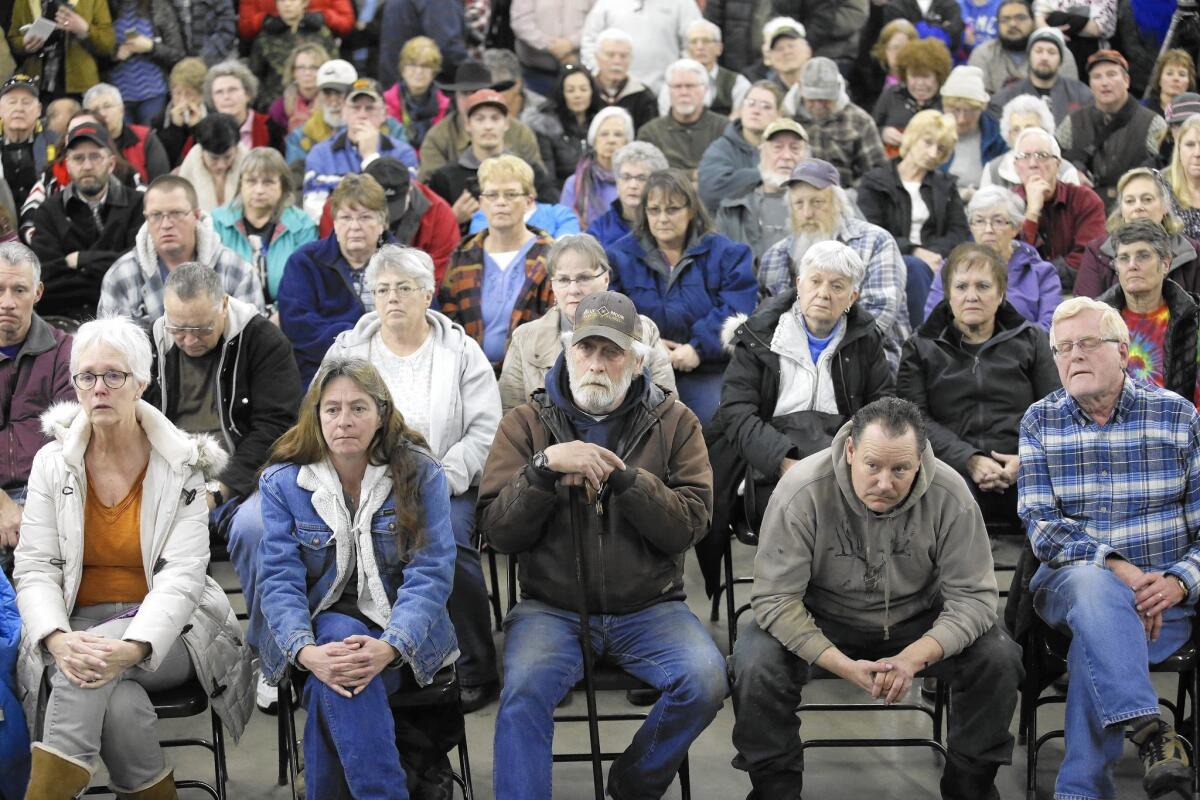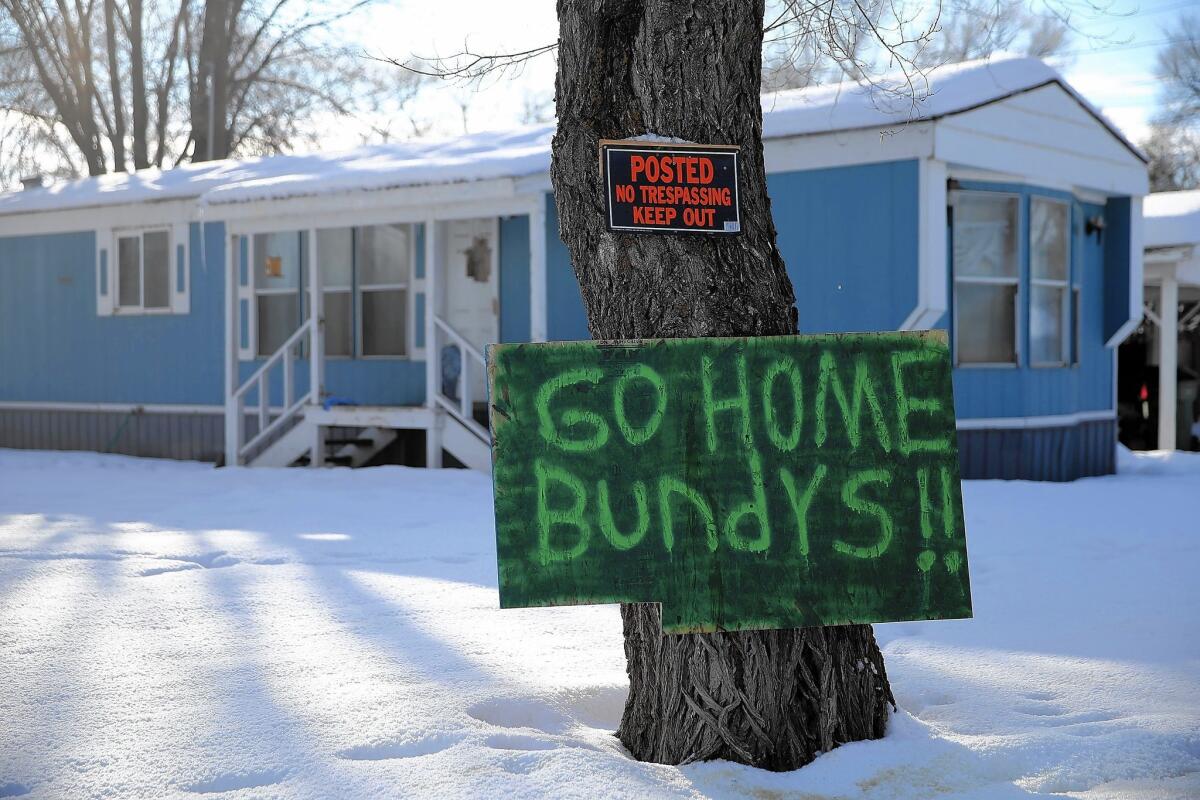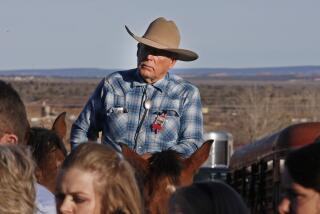Oregon town near armed standoff feels the strain

- Share via
Reporting from BURNS, Ore. — The schools have been closed since the holidays and the front doors to the tiny courthouse are locked tight. Even the local chapter of the 4-H club has nowhere to meet.
Life in Burns, a two-lane highway town that has never entirely crawled out from under the closure of the timber mills, has been put on pause since a band of armed ranchers and activists broke into a compound of vacant government buildings on the edge of a wildlife reserve outside of town.
At a town hall meeting where hundreds turned out to talk about their anxiety, some said they worried that the standoff was bound to end badly and that a deep current of fear had overrun the town’s better sensibilities.
NEWSLETTER: Get the day’s top headlines from Times Editor Davan Maharaj >>
“I’ve seen this before,” cautioned Steve Atkins, a retired U.S. Forest Service worker who addressed his fellow residents Wednesday night, “and it only ends in bloodshed.”
As if to set the tone that higher powers may be needed to bring order back to this high-desert community, residents agreed that the meeting should start with a prayer.
David Ward, the county sheriff who is the lawman in Burns and neighboring Hines, peered through the crowd for a suitable candidate.
“Tim! Tim!” people shouted. They were calling for Tim Titus, pastor of the nondenominational West Bank Christian Fellowship in Hines. An assured presence who speaks in slow, considered sentences, Titus was a natural choice.
Titus waited. Ward looked at him, but continued to search the crowd. In that moment, Titus feared that he had become the latest casualty in a tug of war that has torn this county along ideological lines.
The pastor had met with the activists to share his concerns about their aggressive methods and prayed with them, asking for cooler heads to prevail.
“Am I a convert?” he later wrote on Facebook. “No, they are still breaking the law even if just for trespassing but I do feel I understand their position.”
Ever since the 15 or so ranchers and activists — many of them veterans of dramatic showdowns with authorities over grazing rights on federal land — the community has been divided over whether the occupiers deserve their sympathy or a good strong push straight out of the state. Some feel a bit of both.
The armed occupiers, now calling themselves Citizens for Constitutional Freedom, have assumed a with-us-or-against-us attitude, even labeling Ward an “enemy of the people” after he told the activists they were breaking the law and must leave.
Those tensions were on display at the meeting at the Harney County Fairgrounds, normally only this crowded when the rodeo sets up for the annual county fair.
“There’s people threatening to boycott other people’s businesses they’ve known their whole lives,” said rancher Jesse Svejcar.
See the most-read stories this hour >>
The daily rhythm of life has been interrupted since the strangers arrived, residents agreed.
From the middle of April until sometime in September, the twin towns of Hines and Burns teem with people. As the only cities for miles, birders, cyclists and pickups carrying ATVs stream along Broadway Avenue and Monroe Street, the only true commercial district in this 7,000-person county.
But when winter arrives, things come to a crawl. Snow blankets roads, the traffic through town thins, and whiteout conditions blur the line between ground and sky. So the caravan of television crews, FBI agents and sheriff’s deputies from across the state pouring into town is an arresting sight.

A homeowner in Burns, Ore., expresses an opinion about the armed occupation.
For some — such as the local hotels and restaurants — the attention showered on the occupiers has been a boon. But in many other ways, it has thrown off the town’s equilibrium.
The courthouse is closed, parents have to watch their children because schools are shut, and resources at the sheriff’s office are stretched so thin that Ward has had to reach out to neighboring counties to send in patrol cars.
Ward said it had affected him on a personal level too. One of his wife’s tires had been “flattened,” he said, and someone had followed his parents home.
“You don’t come here and intimidate people. That’s not how we live our lives in Harney County,” Ward said. “Our wives have a right not to be tailed home. Our pastors have a right to not be shouted at on the street.
“You don’t get to threaten me because I disagree with you.”
Join the conversation on Facebook >>
The sheriff delivered the last line to raucous applause, then asked for a show of hands: How many people want the occupiers to go home? he asked. Hundreds raised their hands.
As a first step, he said half-jokingly, the entire town needed to delete Facebook, which has been an incubator for heated arguments about the occupiers.
Svejcar, the rancher, said the town had been divided by cliques in the past — who goes to church with whom, which ranching family gets along with their neighbors. At least the standoff has brought people together in one place, he said.
“If I have to have an armed standoff to get this many people and have a dance in town,” he said, trailing off to loud laughter. “Let’s just knock this crap off. Let’s go back to being friends and neighbors.”
ALSO
After Ruby Ridge and Waco, authorities keep a low profile in Oregon
Cliven Bundy still owes the U.S. $1 million. What are the feds doing to collect it?
Ron Burkle raised $10 million for the Clintons. Now, he has almost nothing to do with them.
More to Read
Sign up for Essential California
The most important California stories and recommendations in your inbox every morning.
You may occasionally receive promotional content from the Los Angeles Times.











